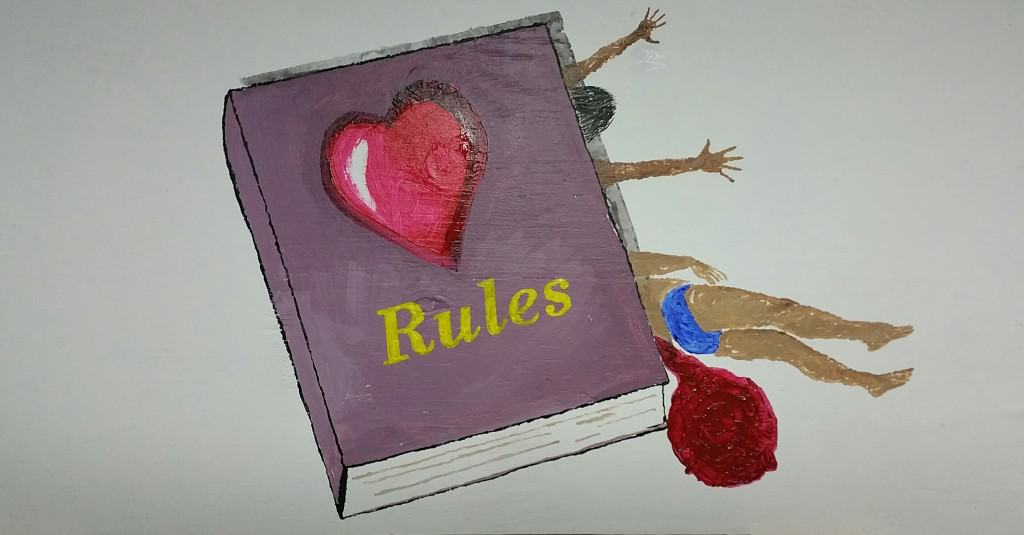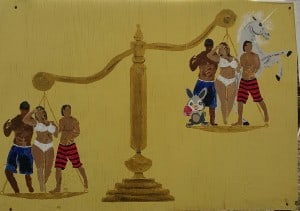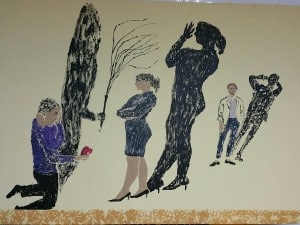 The talk “Polyamory Without Pathos” at Saguaro Man went well. Such a deep subject is impossible to delve into properly in just an hour. Below, I will broach several points mentioned during the talk.
The talk “Polyamory Without Pathos” at Saguaro Man went well. Such a deep subject is impossible to delve into properly in just an hour. Below, I will broach several points mentioned during the talk.
We talked about what I call ‘tragic fiction,’ which is treating something imagined as real and imposing the emotion induced on others. Such behavior endangers affections. A metaphor for this issue is the story of a man rowing a boat in the early morning mist and colliding with another boat. The man yells angrily at the other boat driver to pay attention. When the mist clears, the man sees that the other boat is empty. In this example, we can see that the man conceived another person to blame. Notice that the anger in such a situation is really felt. In relationships, we may not be so lucky as to have a breeze clear the mist away to see the innocent person receiving the brunt of the unrealistic anger, agony or even joy created out of our own thinking.
 When we fail to distinguish between events and what we think about those events (i.e., what the events mean about us), we treat our thinking as not as a subjective idea but as a fact. The difference between our thoughts about reality and reality are at least as different as the thought of eating pizza and actually eating pizza. One of these activities is devoid of any calories even if it is an accurate representation in the mind.
When we fail to distinguish between events and what we think about those events (i.e., what the events mean about us), we treat our thinking as not as a subjective idea but as a fact. The difference between our thoughts about reality and reality are at least as different as the thought of eating pizza and actually eating pizza. One of these activities is devoid of any calories even if it is an accurate representation in the mind.
We also mulled over rules. I made it clear that I don’t think we ever manage other people’s affections by any rules, boundaries or agreements. People disagreed with me on this point. Still, if someone imposes a restriction, e.g. nobody will date another lover unless our partners agree to it, then, to me, it’s trivial to differentiate between calling this a rule, boundary or an agreement. By imposing such a rule, we limit people’s choices arbitrarily and, if any transgression brings consequences, then making a distinction between rules, boundaries and agreements is misleading. Simply using a different word that sounds nicer to describe the same thing solves no problem. A turd is still a turd regardless of what you call it.
 I mentioned that I am not a complete sexual anarchist. I have four rules that, when broken, cause me to use of power. These rules have to do with violence, coercion, deceit and recklessness (such as carelessness that can spread disease). I am willing to separate myself to protect myself and/or others. In the case of deceit, I would withdraw my trust. Imposing changes like the ones I mention above is a use of power. It is unwise to use such power to bring about some desired result in the absence of real danger. If someone is using power and none of the four types of behaviors mentioned above are occurring, then I suspect manipulation or coercion.
I mentioned that I am not a complete sexual anarchist. I have four rules that, when broken, cause me to use of power. These rules have to do with violence, coercion, deceit and recklessness (such as carelessness that can spread disease). I am willing to separate myself to protect myself and/or others. In the case of deceit, I would withdraw my trust. Imposing changes like the ones I mention above is a use of power. It is unwise to use such power to bring about some desired result in the absence of real danger. If someone is using power and none of the four types of behaviors mentioned above are occurring, then I suspect manipulation or coercion.
 I also touched upon values, how our judgments can be distorted by our past experiences or what we have learned. In my youth, I learned to value many things because other people thought them valuable, not because they actually were valuable. These kinds of mistakes are often a confusion of the means with the ends. While this topic is deep, it is also easy to see that our value judgments can change with the circumstances. A glass of water from the tap is worthless when water is abundant, but, in a desert without water, we would, at some point, give all we have for that same glass of water. The ancient Chinese story of The Old Man and the Horse illustrates the issue of our judgments and their weaknesses better than any other story that I have ever heard.
I also touched upon values, how our judgments can be distorted by our past experiences or what we have learned. In my youth, I learned to value many things because other people thought them valuable, not because they actually were valuable. These kinds of mistakes are often a confusion of the means with the ends. While this topic is deep, it is also easy to see that our value judgments can change with the circumstances. A glass of water from the tap is worthless when water is abundant, but, in a desert without water, we would, at some point, give all we have for that same glass of water. The ancient Chinese story of The Old Man and the Horse illustrates the issue of our judgments and their weaknesses better than any other story that I have ever heard.
 I wish I had a recording of the discussion because I am leaving out details and relevant points offered from the audience. One thing I wish to impart to anyone interested in delving into sexuality beyond the typical narratives is this; people both in and out of tradition often give reasons supporting their beliefs about relationships. The fact that it rained is not proof that the rain-dance someone did earlier is the cause. Might it have rained anyway? It is easy to say good things are the result of our beliefs when they happen in spite of any relationship mythology. Sometimes our beliefs can destroy good things when we see those benefits do not correspond to our preconceived ideas. I suggest it is better to doubt our ideas then reject a good thing existing beyond the bounds of our expectations.
I wish I had a recording of the discussion because I am leaving out details and relevant points offered from the audience. One thing I wish to impart to anyone interested in delving into sexuality beyond the typical narratives is this; people both in and out of tradition often give reasons supporting their beliefs about relationships. The fact that it rained is not proof that the rain-dance someone did earlier is the cause. Might it have rained anyway? It is easy to say good things are the result of our beliefs when they happen in spite of any relationship mythology. Sometimes our beliefs can destroy good things when we see those benefits do not correspond to our preconceived ideas. I suggest it is better to doubt our ideas then reject a good thing existing beyond the bounds of our expectations.
Please comment and share via your social networks.



Pingback: Painted Polyamory Problems Saguaro Man | No Shame in Sex